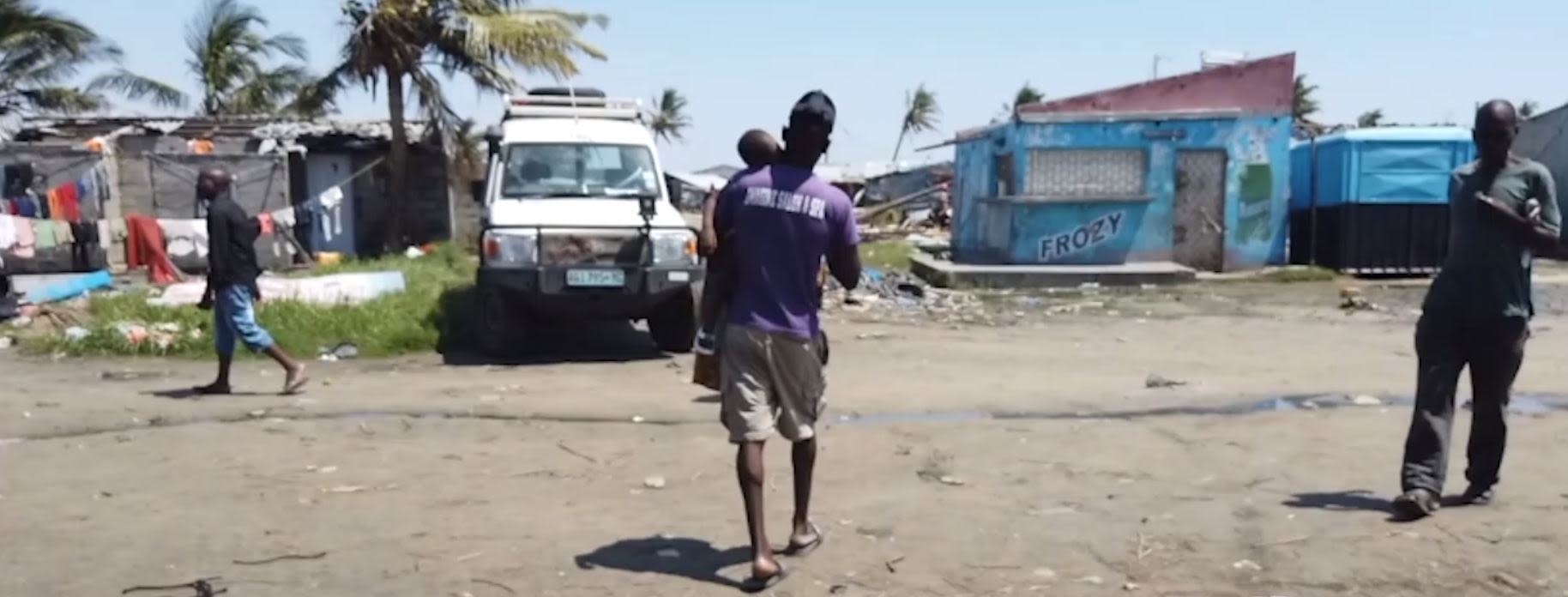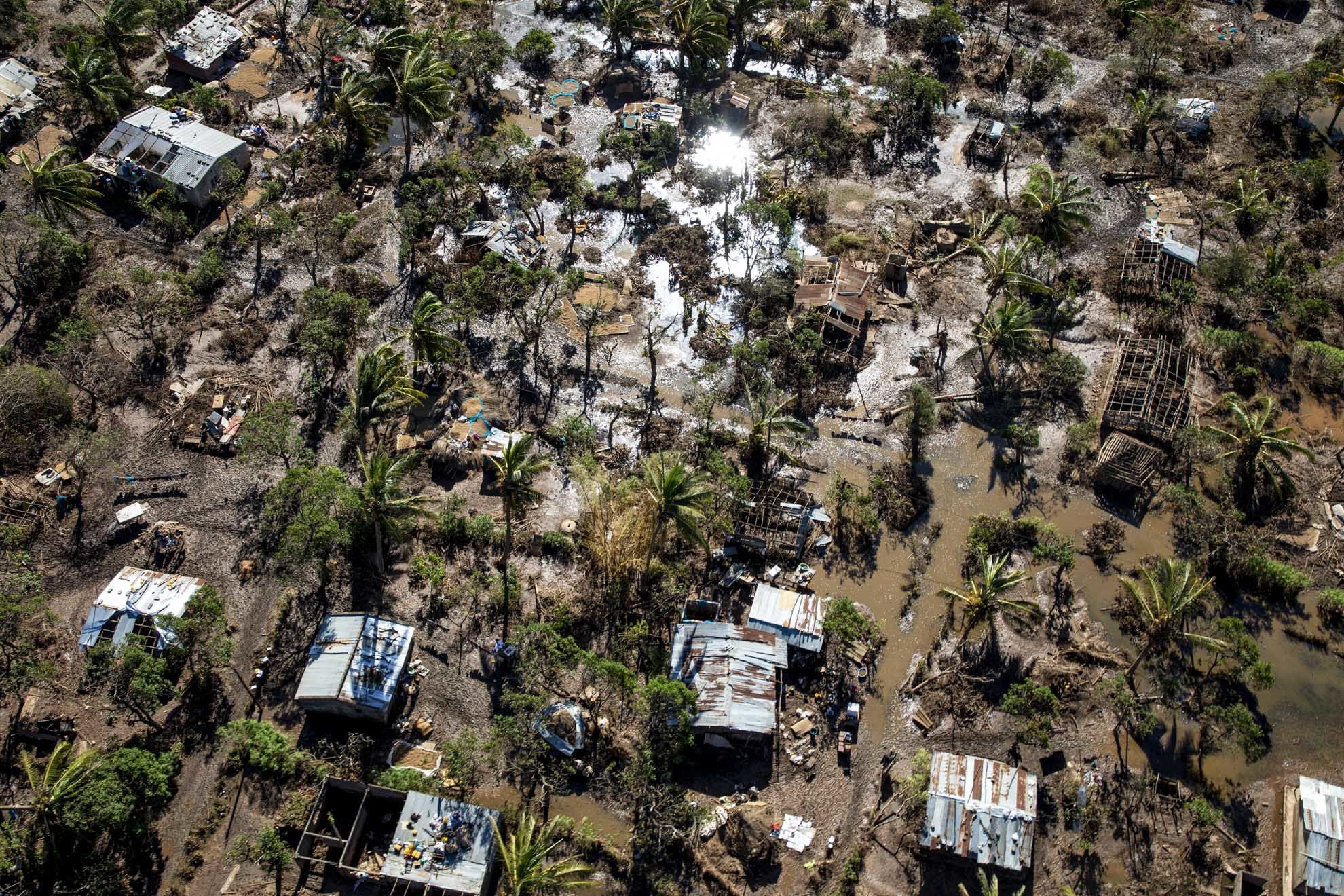FLOODING IN MOZAMBIQUE, MALAWI AND ZIMBABWE

Update 1 May 2019:
Background
Cyclone Kenneth hit the northern coast of Cabo Delgado province in Mozambique on Thursday evening last week. Several towns and communities are heavily damaged. Rains are still continuing, and there are large areas that are flooded, or are at risk of flooding. MSF started Water and Sanitation (WASH) activities in February 2019 in Pemba, the Capital of the Province, and therefore already has a small team present.
Since MSF provided emergency support for the first cyclone (Idai – 14th of March) in the center of Mozambique (Beira), medical and logistical equipment was sent last week to Pemba to anticipate any emergency response. The team in Pemba assessed the area of Macomia and Matemo Island and will further assess different islands where the needs are still unclear.
“Matemo Island is heavily destructed by the cyclone Kenneth, as well as the city of Macomia and its surrounding villages”, explains Danielle Borges, coordinator of the project in Pemba. “We are currently assessing the needs in these hard to reach areas, in order to provide the necessary support. As a medical organization we feel it is crucial to help the existing health services to resume their activities as soon as possible. Today we provided equipment for a diarrhoea treatment center in Pemba, as we fear waterborne diseases will occur in the coming days in the affected area. Other activities will be launched very soon.”
*************************************************************
A weather system that produced heavy rains flooded parts of Malawi in early March 2019, before developing into Cyclone Idai which struck Mozambique and Zimbabwe on 14-16 March, 2019.
A map showing the development of the weather system that brought heavy rain to Malawi, before developing into Cyclone Idai, and the cyclone's trajectory.
A map showing the development of the weather system that brought heavy rain to Malawi, before developing into Cyclone Idai, and the cyclone's trajectory.
The flooding and damage has destroyed homes and infrastructure, displaced thousands of people and the humanitarian needs are enormous.
We have emergency response teams on the ground in all three countries. We are undertaking medical activities and responding to humanitarian needs, including providing non-medical items such as buckets and soap, and ensuring safe water and sanitation.
There are still huge needs in terms of shelter and food with now 72,793 people across 65 displacement sites in Manica, Sofala, Tete and Zambezia.
Water remains a real concern across the flood and cyclone affected areas of Mozambique. While city water supplies have returned to many of the flood and cyclone affected areas, thousands still struggle to access clean water. Our water and sanitation teams are out in the community putting in water points, fixing the water network, and disinfecting and repairing wells.




Mozambique
Situation - Beira and surrounds
- Ninety percent of the area around Beira was damaged, with roads, electricity and communications having been cut off.
- Buildings were submerged and severely damaged; many people are staying with family or friends or in transit centres because their homes are uninhabitable.
- Healthcare infrastructure was damaged, including the hospital; our staff have not yet seen a health centre that is undamaged and fully functional.
- While clean-up efforts by communities are underway, clearing the streets of debris and uprooted trees, extensive repair work to buildings and infrastructure is much needed.
- The cyclone substantially damaged the city’s water supply system, resulting in many people having to drink from contaminated wells or stagnant water.
- As a result of the lack of access to clean water, the Government announced the first recorded cases of cholera on 27 March.
- MSF supported teams have so far treated well over one thousand patients suspected of having cholera in Beira alone. The official number of cholera cases in all of Mozambique is 6,596.
- The flooded area is massive, extending beyond the direct path of the cyclone.
- Authorities have so far confirmed that 602 people have died.




Response
We currently have over 140 international staff and more than 800 Mozambican staff on the ground in the flood-affected areas. More than 100 tons of international air freight supply have been delivered to Beira.
Beira and surrounds
- Medical and non-medical activities have begun in Beira and in areas on the outskirts of the city.
- Our teams are providing medical consultations via mobile clinics in several neighbourhoods of the city, including going door-to-door, looking particularly for cases of severe watery diarrhoea and cholera.
- We are working at full capacity in one partly-rehabilitated health centre, and are getting up to speed in two other partly-rehabilitated centres.
- We are also in discussion with the health ministry about supporting a large cholera vaccination campaign in the area.
- Consultations have included treating small wounds, stomach issues (particularly intestinal worms), and respiratory tract infections.
- Teams are also carrying out non-medical activities, including re-roofing two health centres in the poorest and most-affected neighbourhoods.
Given the sheer amount of water... it’s not surprising that there are outbreaks of water borne diseases like cholera... in the coming days we will work alongside the Ministry of Health to scale up as much as possible and provide support to more cholera treatment units.
This is one of Beira’s numerous transit centres where those rescued from trees, roofs and small patches of dry ground in the flooded areas like Buzi are sheltering.
This is one of Beira’s numerous transit centres where those rescued from trees, roofs and small patches of dry ground in the flooded areas like Buzi are sheltering.
This is one of Beira’s numerous transit centres where those rescued from trees, roofs and small patches of dry ground in the flooded areas like Buzi are sheltering.
This is one of Beira’s numerous transit centres where those rescued from trees, roofs and small patches of dry ground in the flooded areas like Buzi are sheltering.



Zimbabwe
Cyclone Idai hit Chimanimani, a small district of approximately 30,000 people in Manicaland province, late Friday 15 March, after passing through Mozambique.
Situation
We have sent an emergency response team to the mountainous areas of Manicaland province, including the districts of Chimanimani and Chipinge.
Chimanimani and surrounds
An MSF team was finally able to access the district; this is the first time many parts have been accessed from outside help since the cyclone hit. With many roads washed away or flooded, the teams are walking between 3 to 12 kilometres to reach stranded communities, who have no safe water supply.
- We are providing consultations and medical supplies in the stablisation centre set up on the outskirts of Chimanimani.
- Our priority has moved to inside Chimanimani and our staff are working with MoH staff out of the hospital.
- Two outreach teams are also moving around Chimanimani, trying to access health clinics and surrounding settlements to assess health needs, and distribute medicines to clinics and village health workers.
- Teams are responding to health needs including treating trauma injuries, refilling antiretroviral treatment for people living with HIV, and providing medication for people with chronic diseases.
- Longer term, the consequences of blocked access should be considered: electricity was disrupted affecting routine vaccination services; impending stockouts of medical supplies and drugs; treatment interruptions for HIV, TB and chronic disease patients; and a lack of detergents and chlorine.
Chipinge
- A team has reached Copper, a valley to the south, which was one of the hardest hit areas, to conduct an assessment.
MSF doctor Virginia Moneti attends to a patient, Peter Matonhodze from Runyowani village in Chimanimani, eastern Zimbabwe.
MSF doctor Virginia Moneti attends to a patient, Peter Matonhodze from Runyowani village in Chimanimani, eastern Zimbabwe.
MSF nurse mentor attends to a patient, Nyasha Mhere of Chinamira village at a stabilisation centre run by MSF in collaboration with the Ministry of Health and other partners in Chimanimani, eastern Zimbabwe.
MSF nurse mentor attends to a patient, Nyasha Mhere of Chinamira village at a stabilisation centre run by MSF in collaboration with the Ministry of Health and other partners in Chimanimani, eastern Zimbabwe.



Malawi
Extremely heavy rains in lower Shire River districts of Chikwawa and Nsanje, in Malawi’s far south, has been compounded by further rains from Cyclone Idai.
Situation
- Flooding affected the majority of Nsanje district, in southern Malawi; rains have now largely stopped and access to the flooded areas is improving.
- Some areas remain under water or cut off with limited phone communication.
- Around 16,000 households are affected, according to the national disaster report; a huge number of houses have collapsed.
- Many thousands of people are in displacement camps and makeshifts sites such as schools and churches. Big reconstruction efforts will be required in coming weeks.
- There's been huge destruction of agricultural crops and animals; an estimated 50 percent of the area’s crops might have been lost.
- Electricity has returned to Makhanga district, on the eastern bank of the Shire river, which remains the worst-affected area and is still cut off from all road access.
Response
We are responding in several areas with mobile clinics, and water and sanitation activities, and continue to work with local Malawian authorities and the Disaster Management department, plus local and international organisations. Most of our response is occurring in hard-hit Makhanga.
So far, our teams have not detected acute medical needs, but we’re concerned about the many people on chronic medication, including for HIV and TB treatment. To date, there are no reports of waterborne diseases, including cholera, but this remains a concern.
Overall
- Outreach teams have visited communities to clean and repair boreholes plus test the water quality to ensure access to clean water.
- Teams are building basic latrines, showers, shelters; are distributing non-food items and hygiene kits; and educating communities on hygiene and safe water practices.
Makhanga
- A team of 18 people is supporting the health ministry, moving by boat, to cover the needs of an estimated 18,000 people with health, sanitation and non-food-item supplies.
- In Makhanga health centre, we continue to ensure primary health, HIV services and basic disease surveillance; we are currently undertaking approximately 150 consultations per day.
- We have so far reached more than 2,000 households with hygiene kits, which includes buckets, cups, and soap.
- Due to the concern about cholera, we will construct a basic, four-bed cholera treatment unit and conduct training, to be prepared just in case the need arises
Collection, assembly and transport of supplies from Bangula to Makhanga by boats, then once the team has reached Makanga, transport of supplies and medical supplies by cart lead by oxen.
Collection, assembly and transport of supplies from Bangula to Makhanga by boats, then once the team has reached Makanga, transport of supplies and medical supplies by cart lead by oxen.
Collection, assembly and transport of supplies from Bangula to Makhanga by boats, then once the team has reached Makanga, transport of supplies and medical supplies by cart lead by oxen.
Collection, assembly and transport of supplies from Bangula to Makhanga by boats, then once the team has reached Makanga, transport of supplies and medical supplies by cart lead by oxen.
Collection, assembly and transport of supplies from Bangula to Makhanga by boats, then once the team has reached Makanga, transport of supplies and medical supplies by cart lead by oxen.
Collection, assembly and transport of supplies from Bangula to Makhanga by boats, then once the team has reached Makanga, transport of supplies and medical supplies by cart lead by oxen.












